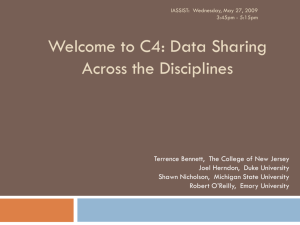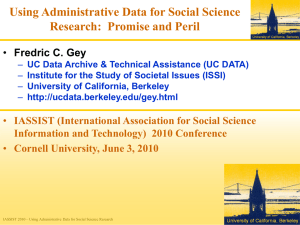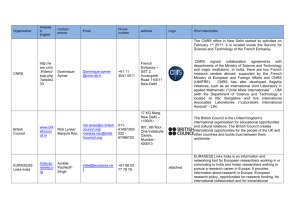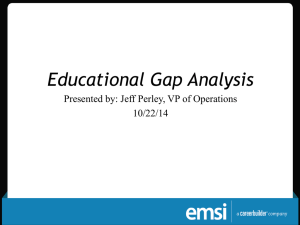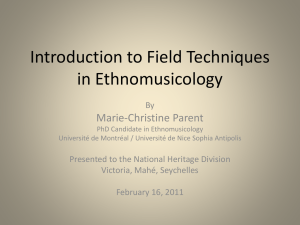WP3 Survey quality
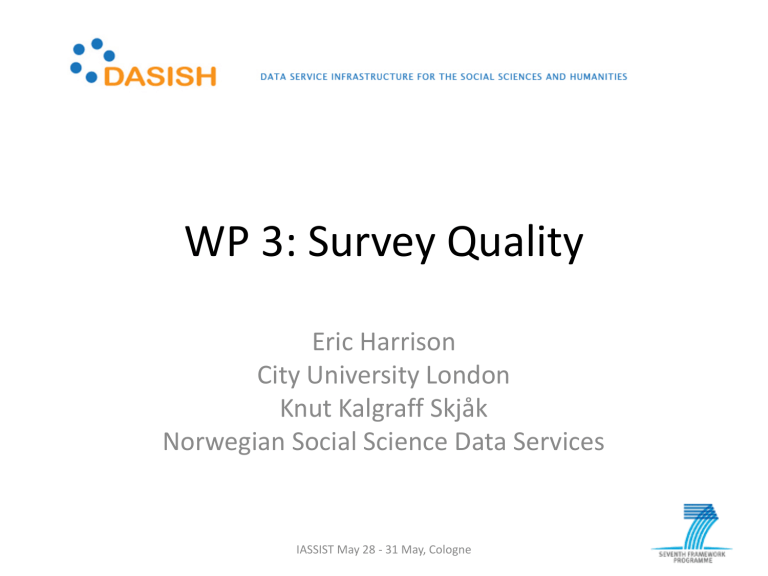
WP 3: Survey Quality
Eric Harrison
City University London
Knut Kalgraff Skjåk
Norwegian Social Science Data Services
IASSIST May 28 - 31 May, Cologne
Content
• 3.1. Tool(s) for coding occupation text strings in the field, online or post-hoc
• 3.2. Three databanks/databases for documenting:
– a) questionnaire design and development,
– b) translation process
– c) question form and quality
• 3.3. Sample management system
IASSIST May 28 - 31 May, Cologne
3.1. Occupation Coding
• To develop software for Europe-wide surveys to collect and code occupation data more accurately, consistently and cost-effectively
• Key is to enable better coding at time of collection
– CAPI tool allowing interviewer to select best match to text from respondent
– Web survey based occupation tree that was trialled in the
Euroccupations project
• Open source code for use in different CAPI languages
IASSIST May 28 - 31 May, Cologne
3.2. Developing a suite of multi-language questionnaire development tools
• Even where practice is good it is not accessibly documented: we address this here a) Development template to become automated and interactive, and to mesh with b) and c).
b) SHARE’s LMU will develop into a fully documented translation tool c) Question Databank: searchable database of multilanguage survey questions, linking to a) and b)
IASSIST May 28 - 31 May, Cologne
Questionnaire design tool,
(City, NSD, FSD)
The 3.2. Suite
Survey Quality Predictor
(Existing tool at UPF)
Question and variable data base, (City, NSD, UPF, FSD)
Translation tool (GESIS,
Centerdata, FSD, MPG, NSD)
QVDB
QDT
SQP
TT
Metadata transfer in the suite – example ESS
Integration with CESSDA ERIC?
3.2. Challenges
• Data elements (schemes) to be transferred
• Tracking:
– Identifiers
– Versions
DDI 3.2
• Timing of the survey lifecycle
• Capacity and stability of systems
IASSIST May 28 - 31 May, Cologne
3.3. Fieldwork Monitoring System
• ...consists of 2 sub-subtasks:
– Development of a real-time fieldwork monitoring system
(applicable across different surveys, countries and modes)
• Currently real-time monitoring of fieldwork and response rates across European surveys problematic. Early warning of differential response rates is difficult to achieve before the problems become entrenched and damage data quality.
– Compiling and analysing a para-dataset (consisting of keystroke data, fieldwork monitoring data, neighbourhood and interviewer characteristics collected in SHARE so far)
Report based on para-dataset on „lessons learned“
IASSIST May 28 - 31 May, Cologne
• SHARE has worked on such a fieldwork monitoring system for the past 4 waves but this is tailor-made for SHARE
• Therefore: task will produce a design for a transportable, standardised system of monitoring employing harmonised metadata files which can aid central field supervision, control and monitoring across surveys, countries, modes, and languages.
• Aim: enhance data quality through improved realtime fieldwork monitoring
IASSIST May 28 - 31 May, Cologne
• SHARE is a CAPI survey keystroke files collected during the last 4 waves
• Keystroke data is helpful to see
– how faithfully questions have been administered
– interview length
– interviewer cheating
• Keystroke files will be augmented with
– interviewer characteristics (such as age, education, gender, experience)
– Neighbourhood information
• AIM: have a para-dataset for quality analysis (e.g. interviewer effects) and a report on lessons learned
IASSIST May 28 - 31 May, Cologne
Progress
• Exchange of information between participants; construction of specifications on all three tasks
• Subcontract signed with Warwick for ‘multilingual CASCOT
5.0’, incorporating 4-6 language user interface and classification files
• ‘Extended description’ produced for Question/Variable Data base (QVDB)
• Review of existing tools developed previously by CESSDA, NSIs
• Progress on specification for a slim version of a standardised fieldwork management system
IASSIST May 28 - 31 May, Cologne
Taking the message beyond DASISH
• Contributions to WP8 quantitative workshops
– Sessions on each theme of the WP: occupation; databases for metadata; fieldwork management systems
– representation from other social surveys: ISSP,
GSS, GGP, Eurobarometer, EVS
– Aim to maintain inter-survey networks
IASSIST May 28 - 31 May, Cologne
Plans for rest of 2013
• Task groups continue software development
• Identify scope of possible content
• Investigate feasibility of trialling software on historic data or forthcoming rounds
• Present on aspects of work at conferences
– IASSIST
– ESRA (session on occupation)
IASSIST May 28 - 31 May, Cologne
